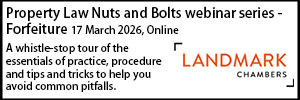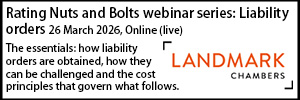Claimants win legal challenge over grant of planning permission for 350-home site after “seriously misleading” officer advice
- Details
Exeter City Council’s planning committee was misled by an officer’s report over an application for a new development and its highway access.
Mrs Justice Lang, sitting in the Planning Court, said in her judgment that councillors had received “seriously misleading advice”.
Claimants Christine Pratt and the Sandy Park Farm Partnership sought judicial review of Exeter’s decision in July 2023 to grant developer Waddington Park outline planning permission for the demolition of existing buildings and construction of up to 350 dwellings at Old Rydon Lane.
Ms Pratt lives in this road, where the partnership conducts a property management and farming business.
Exeter approved Waddington Park’s proposed access scheme which included restrictions on vehicles in Old Rydon Lane with its partial closure and introduction of a one way street, with traffic to and from the proposed development using the road.
Devon County Council is the highways authority and raised no objection to this plan.
Ms Pratt and the partnership argued that Exeter failed to assess the impacts of the access scheme on the existing residents of Old Rydon Lane.
They also claimed the planning officer gave materially misleading advice to on the feasibility of implementing an alternative access scheme across the partnership’s land, and so the council failed to discharge its Tameside duty to investigate whether land was available for sale for this.
The judge said Exeter had said it did not intend to contest the claim and accepted “the decision under challenge was unlawful…for the reasons set out in the claimants' statement of facts and grounds …. and consents to judgment on that basis”.
Waddington Park though as an interested party contested the two grounds advanced by Ms Pratt and the partnership.
The first of these was that Exeter ought to have assessed the likely impacts of the access scheme on residents in Old Rydon Lane, and weighed them in the planning balance, and the second that Devon failed to discharge its statutory duty under section 122 of the Road Traffic Regulation Act 1984 to have regard to the desirability of securing and maintaining reasonable access to premises and expeditious and convenient movement of traffic.
Lang J said: "Unfortunately, Devon CC decided not to participate in these proceedings and therefore the court has no explanation for its undisputed failure to consider the availability of highway access and loss of amenity for the existing residents of Old Rydon Lane in its consultation response.
“This was a statutory consultation response, in its capacity as the highways authority, and therefore section 122 Road Traffic Regulation Act 1984, which expressly requires such matters to be considered in the performance of its statutory functions, appears to be engaged. But even if it was not engaged, the availability of highway access and loss of amenity was a relevant consideration for Devon CC to take into account when making its consultation response.”
She said objections by Ms Pratt and others put Exeter on notice that existing residents were concerned about Waddington Park’s access scheme, and Exeter “was obliged to have regard to these matters under the development plan, and because they were a material consideration”.
The judge added: “In my view, the planning officer could easily have asked [Waddington Park] and Devon CC if they could provide further responses addressing these matters.
“It is common practice for a planning officer to ask applicants for planning permission and statutory consultees for further information.
“I cannot see any legal foundation for [Exeter’s] submission that [it] was entitled to assume that Devon CC had complied with its obligations in making its consultation response and so no further enquiry was needed.
“I accept the claimants' submission that the defendant's failure to investigate these matters further was a breach of its Tameside duty, as no reasonable planning authority could have been satisfied that it possessed the information necessary to make its decision.”
Lang J said the planning officer's advice had been seriously misleading because members should have been advised that a condition could be used that prohibited the development until a specified action has been taken.
There was also no evidence to support Waddington Park’s claim that land for the alternative access route would be too costly, leading to the risk of loss of the significant financial benefits to be gained from the grant of planning permission.
The judge said: “In my view, it is significant that [Exeter] has conceded that its planning officer gave seriously misleading advice to its planning committee, in the manner alleged by the claimants.”
She added the planning officer appeared to have consulted only Waddngton Park and not the partnership.
Lang J said section 31(2A) of the Senior Courts Act 1981 was not engaged as the council should reconsider the application and “I am not satisfied that that the outcome for the claimant would not have been substantially different if the conduct complained of had not occurred”.
Mark Smulian
Sponsored articles
Walker Morris supports Tower Hamlets Council in first known Remediation Contribution Order application issued by local authority
Unlocking legal talent
Legal Officer
Senior Solicitor - Property
Legal Director - Government and Public Sector
Locums
Locums
Poll














































